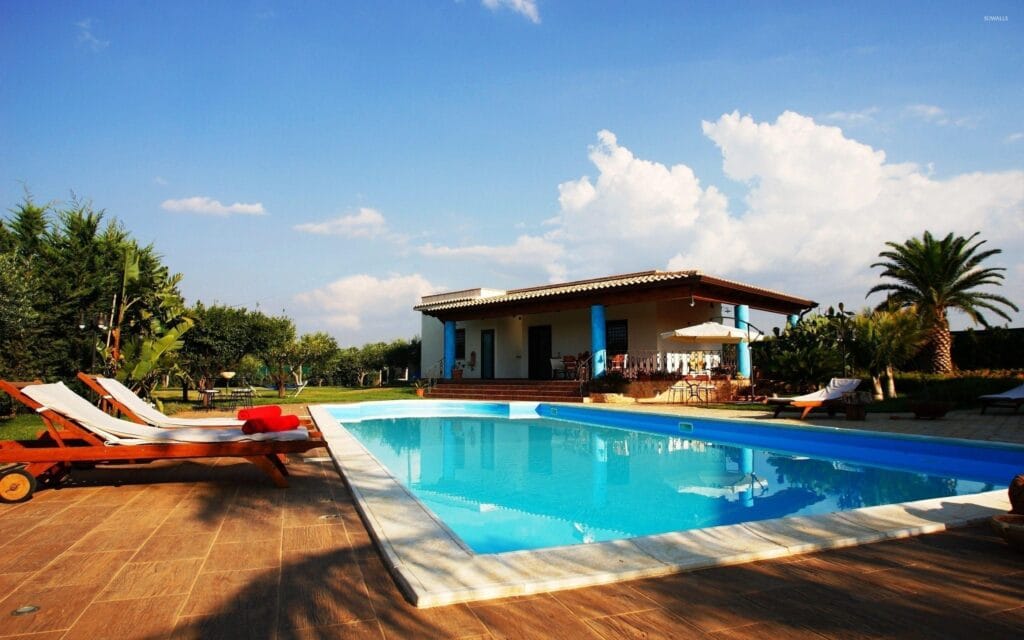How Florida Rainstorms Affect Your Port Charlotte Pool (And How to Protect It)
Florida is famous for its sunshine and year-round swimming weather, but every pool owner in Port Charlotte knows the other side of the story: sudden, heavy rainstorms. While these downpours can be refreshing on a hot day, they often leave your pool looking cloudy, unbalanced, and unsafe for swimming.
If you’ve ever wondered why your pool water turns murky or why algae seems to bloom right after a storm, you’re not alone. Understanding the impact of Florida’s weather on your pool—and how to respond—can save you time, money, and frustration. Let’s dive into how rain affects your pool and the steps you can take to keep it safe, sparkling, and ready for family fun.
1. How Rain Dilutes Chemicals
One of the most common issues after a storm is chemical dilution. When large amounts of rainwater enter your pool, it reduces the concentration of chlorine and other sanitizing chemicals. Chlorine is your pool’s first line of defense against bacteria, algae, and other microorganisms.
If chlorine levels drop too low, you’ll quickly notice:
- Cloudy or greenish water
- Strong odors caused by chloramines
- Increased algae growth
- Higher risk of bacteria in the water
Solution:
- Test your pool water immediately after a storm.
- Adjust chlorine, pH, and alkalinity levels promptly.
- Keep pool shock on hand for fast response.
👉 For consistent care, consider weekly pool service in Port Charlotte to ensure chemicals are balanced, no matter how unpredictable the weather.

2. Debris Accumulation from Storms
Storms don’t just bring rain—they bring debris. Leaves, branches, dirt, pollen, and even small trash items can end up floating in your pool. This debris clogs filters and skimmers, disrupts circulation, and becomes food for bacteria and algae.
Left unattended, organic debris will decay, creating cloudy water and foul odors.
Solution:
- Skim the surface as soon as possible after rainfall.
- Vacuum the pool floor to remove settled dirt.
- Brush pool walls to stop organic matter from sticking.
- Use a pool cover or leaf net before storms when possible.
Consistent debris removal is one of the best defenses against algae and filter overload.
3. Stagnant Water and Poor Circulation
Heavy rain can overwhelm your pool’s circulation system. When circulation slows, water becomes stagnant—allowing particles to settle, algae spores to grow, and chemicals to lose effectiveness.
Solution:
- Run your pool pump longer after rainfall (often double your normal cycle).
- Inspect pumps, filters, and skimmers to ensure proper operation.
- Schedule regular filter cleaning as part of weekly pool maintenance in Charlotte County.
Strong circulation = clear water + effective chemical use.
4. Algae Growth in Rainy Conditions
Florida’s humid climate is already an algae paradise—and when storms lower chlorine levels and add organic debris, algae growth can explode. Sometimes, a pool turns green within just 24–48 hours after a storm.
Algae not only looks bad but also creates slippery surfaces that can make swimming unsafe.
Solution:
- Shock your pool immediately after heavy rainfall.
- Use algaecide as a preventive measure during rainy months.
- Brush pool walls and steps regularly to prevent algae clinging.
👉 Check out our guide on how to prevent green pool water after storms for deeper tips.
5. Equipment Considerations After Heavy Rain
Storms don’t just affect your water—they can stress your pool equipment. Pumps, filters, and heaters often work overtime after storms, and if clogged with debris, they may break down prematurely.
Solution:
- Inspect filters and baskets after every storm.
- Check for leaks or unusual noises in pumps.
- Clear debris from skimmer and pump baskets.
- Schedule professional inspections to catch hidden damage.
Preventive care now saves you costly repairs later.
6. Safety Tips During Rainy Season
Heavy rain doesn’t just cloud your water—it creates safety hazards. Pools with low chlorine or high debris levels can harbor bacteria and make swimming dangerous.
Here are key safety steps:
- Keep kids and pets away until water is tested and treated.
- Avoid swimming during or immediately after lightning storms.
- Inspect pool decks for slippery areas caused by algae or rain runoff.
Professional pool service ensures your water stays safe, not just clear.
7. Long-Term Rainy Season Strategies
If you’re a Charlotte County homeowner, storm season is a yearly challenge. Preparing in advance makes maintenance easier and keeps your pool enjoyable year-round.
Smart strategies include:
- Pre-Storm Prep: Balance chemicals and clear debris before rain hits.
- Post-Storm Routine: Skim, vacuum, brush, and test chemicals right away.
- Invest in Automation: Smart pool sensors and automatic chemical feeders maintain balance even when you’re busy.
- Keep a Maintenance Log: Track chemical levels, cleaning, and storm impacts for better long-term management.
8. Why Weekly Professional Service Is the Best Solution
Even if you’re diligent, storms can overwhelm your routine. That’s where professional service comes in. With weekly pool service in Port Charlotte, you get:
- Expert chemical testing and balancing
- Professional-grade equipment inspections
- Thorough debris removal and filter cleaning
- Peace of mind knowing your pool is safe year-round
Florida storms are unpredictable, but your pool care doesn’t have to be.
Call to Action
Don’t let Florida’s rainy season ruin your pool! 🌧️
👉 Keep your Port Charlotte pool crystal clear, safe, and storm-ready.
Schedule your weekly pool service with FloridaDetail.com today for expert chemical balancing, debris removal, and equipment maintenance.
💡 Bonus: For more pool care hacks and maintenance insights, check out UnlimitedManiac.com — your go-to resource for lifestyle tips and guides.
